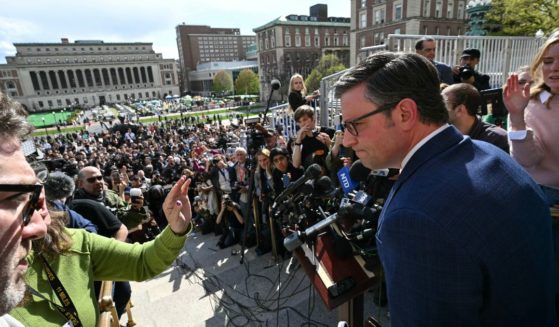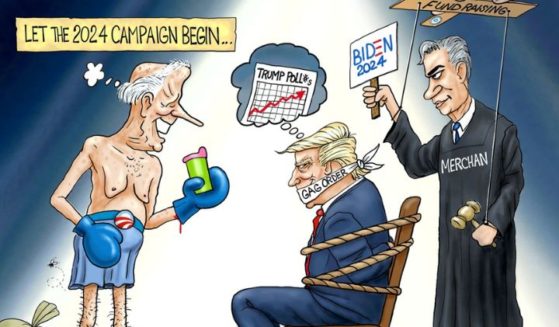Get the latest news delivered right to your email.
2024 Election
Top Stories
Advertisement
Foreign Students Who Get Suspended for Anti-Israel Activities Could Face Even Tougher Punishment, DHS Confirms
Foreign students who join in anti-Israel protests at colleges and are suspended could face some major consequences.
By Jack Davis
April 25, 2024
Comment
MoreShare
Columbia Anti-Israel Agitators Triggered When Mike Johnson and Other GOP Lawmakers Show Up at Encampment
While on campus, Johnson said Congress would not be silent while Jews were afraid to go to class at an American university.
By Johnathan Jones
April 25, 2024
Comment
MoreShare
Justice Held Hostage
For more A.F. Branco cartoons, go to WesternJournal.com/cartoons.
'Let's Go, Bro, She's Waking Up' - 2 NYPD Officers Arrested for Allegedly Assaulting Woman While Off-Duty
Video allegedly showed the two men carrying the woman into an apartment building with her eyes closed and mouth open.
By Adelle Nazarian
April 25, 2024
Comment
MoreShare
Watch: Woman's How-To Video on Abortion Goes Wrong When People Notice What's in Background
Viewers were shocked at what they saw in the background of a TikTok user's tutorial video on how to perform an at-home abortion.
By Anthony Altomari
April 24, 2024
Comment
MoreShare
Report: Family Outraged at Disney World - Realized the Evil Queen 'Actress' They Took Pics with Was a Man
A father was outraged when it appeared that Walt Disney World reportedly hired a man to interact with children as the Evil Queen.
By Allison Anton
April 24, 2024
Comment
MoreShare
Watch: Biden Admits 'We Can't Be Trusted' in Latest Major Blunder
Watch the clip with YouTube's closed captioning on, and you'll see that even its talk-to-text AI recognized what Biden said here.
By George C. Upper III
April 24, 2024
Comment
MoreShare
Interviewer's Simple Question Gets NYU Protester to Admit She Has No Idea What's Going On: 'I Wish I Was More Educated'
These protesters didn't even try to act as if they knew the reasons they were protesting NYU at all, admitting ignorance almost immediately.
By Allison Anton
April 24, 2024
Comment
MoreShare
Advertisement
'Woman': The Left's Absurd Quest to Redefine the Term
The question “What is a woman?” is perfectly leveraged to produce absurdity because to pose this question is absurd.
Comment
MoreShare
Biden Breaking the Ten Commandments: Part Four - Bidenomics Subverts the Sabbath
Biden is upsetting the balance of rest and work ordered by God — and Americans are paying the price economically and spiritually.
Comment
MoreShare
Former Military Chaplain Talks Becoming Battle-Ready to Serve in God's End-Times Army
U.S. Army Col. (Ret.) David Giammona believes the world is entering the end times, and "the Lord wants us to work even harder."
Comment
MoreShare
Advertisement



































